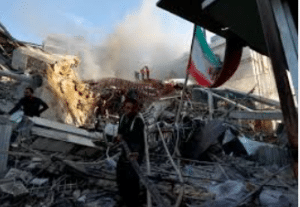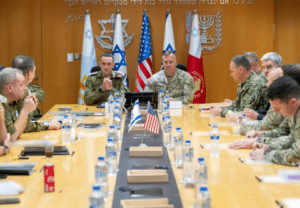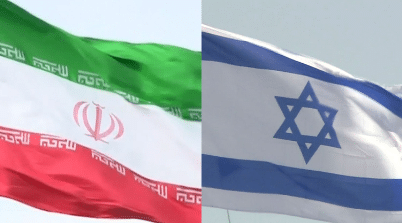Keywords:
Iran-Israel conflict, US warning to Iran, Middle East tensions, Hamas assassination, Hezbollah commander, Lebanon evacuation, airspace advisory, India response, global security, military exercises.
The Middle East is on the brink of a broader conflict as tensions between Iran and Israel reach new heights. The United States has issued a stern warning to Iran, declaring that any attack on Israel will be met with “significant consequences.” This development follows the high-profile assassinations of Hamas leader Ismail Haniyeh in Tehran and senior Hezbollah commander Fuad Shukr in Beirut, further inflaming the already volatile situation.
US and UK Urge Citizens to Leave Lebanon Amid Escalating Tensions
As the situation deteriorates, the United States, the United Kingdom, and other nations have urged their citizens to leave Lebanon, citing safety concerns. The advisories come in response to growing fears that the conflict could spill over into neighboring countries. The recent killings of key figures in Hamas and Hezbollah have only intensified these concerns, raising the likelihood of a wider regional confrontation.

Airspace Warnings and Airline Suspensions
In light of the heightened military activity, several countries have issued warnings to their airlines to avoid Iranian and Lebanese airspace. Egypt’s civil aviation ministry confirmed that it received a notification from Iranian authorities about scheduled military exercises over Iranian airspace on August 7-8, 2024.
These exercises have prompted increased caution among airlines operating in the region. United Airlines, a major US carrier, has continued its suspension of flights to Tel Aviv, a precautionary measure that was first implemented on July 31 due to security risks. This suspension underscores the serious concerns about air travel safety in the region during this turbulent period.
India Calls for Restraint and Dialogue as It Issues Advisories to Nationals
India has expressed deep concern over the escalating conflict and has called for all parties involved to exercise restraint and pursue dialogue. The Indian government has emphasized the importance of de-escalation, urging that the underlying issues be resolved through diplomatic means.
Advisories to Indian Citizens: The Indian External Affairs Ministry has reported that approximately 3,000 Indian nationals are currently in Lebanon, with another 10,000 in Iran. In light of the situation, the Indian embassies in both countries have issued advisories for citizens to remain vigilant and take necessary precautions. The Indian government is closely monitoring developments and has stressed the need for a peaceful resolution to avoid further instability in the region.
Global Implications and Future Outlook
The ongoing Iran-Israel conflict has significant implications not only for the Middle East but also for global security. The assassinations of prominent figures in Hamas and Hezbollah have escalated tensions, with the potential for a broader conflict drawing in multiple regional and global powers.
The US has made it clear that any aggression from Iran towards Israel will trigger a strong response, setting the stage for a possible military confrontation. Meanwhile, the international community is urging for calm and diplomatic engagement to prevent further escalation.
As the situation continues to evolve, countries worldwide are watching closely, preparing for potential impacts on global security, economic stability, and international relations.

Recent Developments in the Iran-Israel Conflict
- Assassinations Escalate Tensions: The recent assassinations of Hamas leader Ismail Haniyeh in Tehran and Hezbollah’s senior military commander Fuad Shukr in Beirut have significantly escalated tensions. These high-profile killings are seen as direct provocations that could trigger broader hostilities. The assassinations underscore the volatile nature of the region and the potential for retaliatory actions.
- US Warning: A senior US administration official has warned that Iran will face “significant consequences” if it chooses to attack Israel. This statement reflects growing concerns about the potential for direct military conflict and the broader implications for regional stability. The US has reiterated its commitment to defending its ally, Israel, and maintaining peace in the region.
Global Reactions and Precautions
- Advisories and Evacuations: In response to the escalating conflict, several countries, including the US and the UK, have issued advisories for their citizens to leave Lebanon. The safety warnings come amid fears that the conflict could spread beyond Israel and Lebanon. The UK Foreign Office and US State Department have both emphasized the importance of evacuating non-essential personnel and travelers from the region.
- Airspace Alerts: The Egyptian Civil Aviation Ministry has confirmed that Iranian authorities notified them of planned military exercises over Iranian airspace on August 7 and 8, 2024. These exercises have led to increased caution among airlines and prompted several to reroute or suspend flights. United Airlines has confirmed that it has suspended flights to Tel Aviv due to ongoing security concerns, a measure initially taken on July 31, 2024.
India’s Diplomatic Efforts and Advisory Measures
- Government Response: India has expressed “extreme concern” over the escalating situation and has called for restraint and dialogue. The Indian government has emphasized the need for a peaceful resolution and urged all parties to engage in diplomatic negotiations to avoid further conflict.
- Advisories for Nationals: The Indian External Affairs Ministry has reported that approximately 3,000 Indian nationals are currently residing in Lebanon, while another 10,000 are in Iran. In light of the conflict, Indian embassies in both countries have issued advisories urging citizens to exercise caution and stay informed about the security situation. The Indian government is working to ensure the safety of its citizens and is prepared to facilitate evacuations if necessary.
Regional and Global Implications
- Impact on Regional Stability: The escalating conflict has significant implications for regional stability. The involvement of key actors like Iran and Israel, along with Hezbollah and Hamas, raises the risk of a broader confrontation that could destabilize the entire Middle East. The potential for increased violence and disruption is a major concern for neighboring countries and international stakeholders.
- Economic and Humanitarian Impact: The conflict’s impact extends beyond military engagements, affecting economic conditions and humanitarian concerns in the region. Disruptions to trade, travel, and economic activity are expected, along with potential humanitarian crises resulting from increased violence and displacement of populations.
- International Response: The international community is closely monitoring the situation, with diplomatic efforts aimed at de-escalation. Various countries and organizations are engaged in efforts to mediate and prevent further escalation. The conflict’s broader implications for global security and economic stability are a significant concern for international leaders.
As the situation in the Middle East continues to evolve, the international community faces a critical challenge in managing the conflict and mitigating its impacts. The US warning to Iran and the global reactions underscore the seriousness of the situation. Continued diplomatic efforts and strategic responses will be essential in addressing the crisis and seeking a resolution that prevents further instability in the region.





